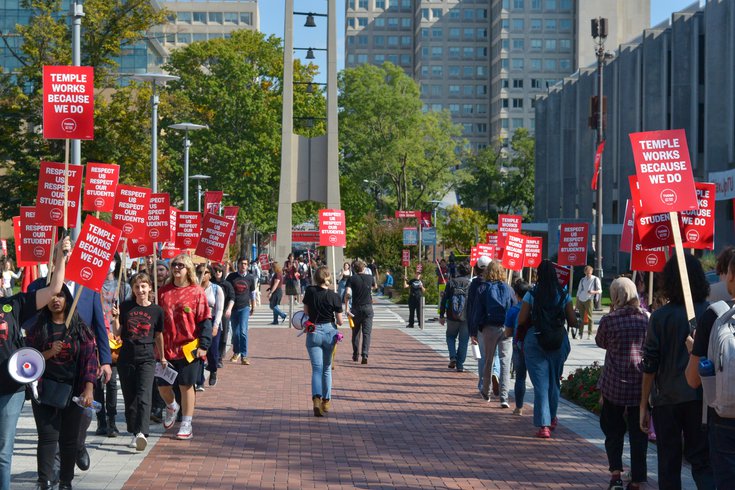
January 31, 2023
 Provided Image/Laurie Robins
Provided Image/Laurie Robins
Temple University's graduate student teaching and research assistants went on strike Tuesday, demanding better pay and health care benefits. Above, union members rally on main campus last year.
Nearly 750 Temple University graduate students, who serve as teaching or research assistants, went on strike Tuesday after nearly.a year of unsuccessful attempts to negotiate a new contract.
The Temple University Graduate Student Association, the labor union representing the students, said the strike will continue until the university offers a contract that includes higher wages, better health care benefits and increased parental leave.
Temple uses teaching assistant to help teach its core curriculum and offer support outside the classroom. Research assistants help conducts studies that bring in millions of dollars in revenue, the labor union said.
The students receive free tuition and health care benefits. Over the course of nine months, they make an average of $19,500, according to the union.
The union is asking to increase that stipend to $32,000, noting the students' current pay is about half the cost of living in Philadelphia. The union also is seeking more than five days of parental leave and health coverage for family members, including dependents. It currently costs them $500 per month to add a dependent to their health plan, the union said.
The union has been working without a contract since Feb. 15.
"For over a year, our union has been trying to work with the administration to negotiate a living wage, better benefits, and improved working conditions," said Bethany Kosmicki, one of the union's negotiators. "Temple's administration has repeatedly ignored our demands, refusing us fair pay, affordable dependent health care, and increased parental leave. TAs and RAs are a core function of the university, teaching essential courses and conducting world-class research. We deserve a contract that reflects our value to the university."
Temple has proposed increasing the students' stipends to $22,500 by 2026. It also has said it will offer one-time payments of $250 or $500, and add more parental and bereavement days.
"After almost a year of negotiations, TUGSA continues to demand 50% pay increases, increases in free health coverage and other benefits not available to even full-time employees," Temple spokesperson Stephen Orbanek said. "The pay increases, one-time payments, and cost-free benefit package that the university has offered to TUGSA would allow the university to continue attracting and retaining outstanding graduate students while responsibly managing a budget primarily funded by tuition dollars. This compensation package is valued at more than $40,000 annually for a nine-month commitment of working 20 hours per week while providing 12 full months of free health coverage."
Temple previously set up a webpage to answer questions from students who want to know how the strike will affect their studies. It also provides information for union members, emphasizing that they are not obligated to join the strike, and noting they will lose pay, tuition remission, health benefits while out on strike.
The strike comes as several major universities have increased their stipends for graduate students. Last month, the University of Pennsylvania awarded its doctoral students a pay increase of nearly 25%.
"This one-time increase recognizes the unique pressures they currently face, especially in the wake of delays to research and hiring that many experienced during the COVID-19 pandemic," interim Provost Beth A. Winklestein said in December.
Princeton University, Yale University, Duke University and the University of North Carolina at Chapel Hill also have increased graduate pay during the last year.
In October, TUGSA issued its first public statement about its labor dispute with Temple, claiming the university had refused to productively engage in contract negotiations. Members rallied on Temple's main campus, calling for change.
"We are a core function of the university, as TAs both support faculty and teach as full instructors, and RAs work in labs and assist on all of the university's research projects," a union spokesperson said at the time.
The union voted to authorize a strike in November.